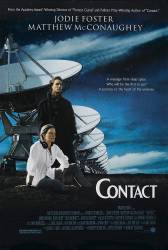Corrected entry: Ellie tells Palmer, "There are 400 billion stars out there, just in our galaxy alone. If only one out of a million of those had planets, alright, and if just one in a million of those had life, and if just out of a million of those had intelligent life, there would be literally millions of civilizations out there." Such a brilliant MIT grad, should be more convincing using mathematical arguments: 4.00E+11 x 1/1.00E+6 x 1/1.00E+6 x 1/1.00E+6 = 4.00E-7 (that's 0.0000004 planets in our galaxy with life!) Not a very persuasive argument for vast quantities of life in the universe. (00:17:15 - 00:17:45)

Contact (1997)
21 corrected entries
Directed by: Robert Zemeckis
Starring: Matthew McConaughey, John Hurt, Jodie Foster, Tom Skerritt, David Morse, Jena Malone, Geoffrey Blake
Factual error: When Mr. Hadden reviews Ellie's life history on his airplane, he says she graduated from MIT 'magna cum laude'. This is impossible, as MIT does not award academic honors to graduates.
Panel member: If you were to meet these Vegans, and were permitted only one question to ask of them, what would it be?
Ellie Arroway: Well, I suppose it would be, how did you do it? How did you evolve, how did you survive this technological adolescence without destroying yourself?
Question: How did they film the scenes where real historical figures (President Clinton, for instance) made speeches and comments they didn't make in real life?
Answer: They used real footage and used careful editing to make it appear as if they were talking about the events of the film.





Correction: Yeah, well, with the current estimate being that there are over a hundred billion galaxies in the observable universe, many of which are deemed to be considerably larger than our own, I think you'll find that Ellie's statement is, in fact, perfectly correct.
Tailkinker ★
Nope. There would need to be 2.5 Trillion galaxies, considerably more than "over a hundred billion" for Ellie's math to be correct.
Actually 2.5 Trillion bears out 1,000,000 planets with life. So... technically, there would need to be 5 Trillion to bear out 2,000,000 planets with life, thus meeting the requirements for use of the word millions, with an "s" as in plural of.
You're working on the idea of galaxies rather than stars. if each galaxy held 400 billion stars than the original corrections claim is easily in the right.
There are galaxies that are far bigger than Milky Way, even hosting a trillion or more stars.
But she's not talking about other galaxies. She is talking about planets and stars in our galaxy. The entry is correct, she's talking about an extremely low percentage.
lionhead